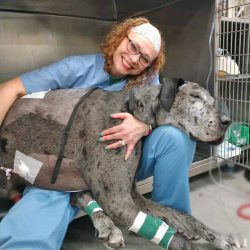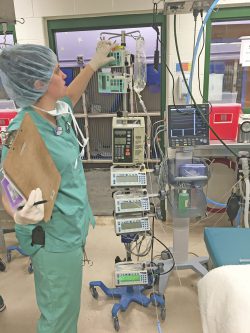
Licensed Veterinary Technicians (LVTs), referred to as veterinary nurses at MSU, are integral members of the veterinary healthcare team. The nurses of the animal medicine world, like nurses in human medicine, are medical professionals who have been educated in the latest medical advances and are skilled at working alongside veterinarians to provide pets with the best care possible.
Patient care, laboratory specimen analysis, surgical assistance, anesthesia, diagnostic imaging (x-ray, ultrasound, CT), nutritional management, dental prophylaxis, physical therapy, client education, and more—these are all important, and just some of the diverse medical responsibilities that veterinary nurses are entrusted with. On top of being compassionate, motivated animal advocates who are dedicated to animal health care, veterinary nurses also are highly involved in every aspect of the work they do.
At MSU, some nurses have even decided to become Veterinary Technician Specialists (VTS). A VTS is a veterinary nurse who has a specific passion, interest, and skill in a particular arm of veterinary medicine—emergency and critical care, dentistry, internal medicine, anesthesia and analgesia, to name a few. In addition to becoming a licensed veterinary technician, VTSs must have additional training and certification.

“Becoming a specialized veterinary nurse is not an easy feat; it requires years of clinical experience and continuing education, submission of in-depth case logs, and ultimately passing a rigorous boards-certifying exam,” says Dr. Nyssa Levy, clinician for the MSU Small Animal Emergency and Critical Care Medicine Service. Also included in the list of requirements for specialist certification are letters of recommendation, skills assessments signed by a supervisor, and detailed case studies.
In 1994, the National Association of Veterinary Technicians in America (NAVTA), established a committee and credentialing body to guide and support those veterinary nurses who are interested in a specific veterinary discipline. To qualify for credentialing in any veterinary nursing specialty, candidates must be licensed/credentialed/registered veterinary technicians who have the requisite training, experience, and education to qualify for the academy’s specialty exam. As of April 2022, NAVTA has 5 recognized and 10 provisionally recognized specialized certifications for qualified VTS candidates: Emergency and Critical Care, Dental, Internal Medicine, Anesthesia and Analgesia, Zoological Medicine, Clinical Practice (all recognized); Laboratory Animal, Veterinary Behavior, Clinical Pathology, Dermatology, Equine, Physical Rehabilitation, Veterinary Nutrition, Ophthalmology, Surgical, Diagnostic Imaging (all provisionally recognized).
“Taking patient care and veterinary services to the next level, VTSs are part of what makes MSU’s veterinary nursing team so special,” says Levy. “This is something our Hospital, College, and Veterinary Nursing Program should be extremely proud of.”
- Bea Biddinger: VTS-ECC (Emergency and Critical Care, MSU's and the state of Michigan's first-ever VTS)
- Maggie Bodiya: VTS-AVTAA (Anesthesia/Analgesia)
- Melissa Calus: VTS-AVTAA (Anesthesia/Analgesia)
- Molly Lazar: VTS-AVTAA (Anesthesia/Analgesia)
- Kris Springsteen: VTS-AVTAA (Anesthesia/Analgesia)
- Donna Averill: VTS-AVOT (Ophthalmology)
- Sara Grabiel-Duncan: VTS-AVOT (Ophthalmology)
- Danielle Bolm: VTS-AIMVT (Behavior)
- Jessica Perry: VTS-ECC (Emergency and Critical Care)
- Teryl Hall: VTS-ECC (Emergency and Critical Care)
- Sarah Erickson: VTS-ECC (Emergency and Critical Care)
